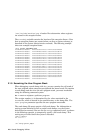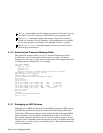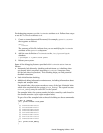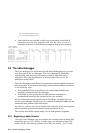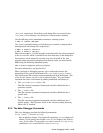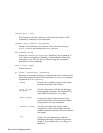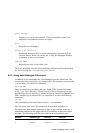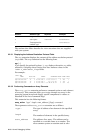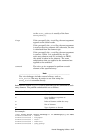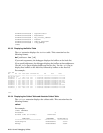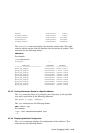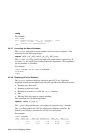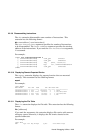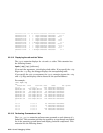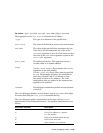
Notation Address Type Replaces Example
k
kseg
fffffc00 k0x00487c48
u user space
00000000 u0x86406200
?
Unrecognized or
random type
?0x3782cc33
The sections that follow describe the kdbx extensions that are supplied
with your system.
2.2.3.1 Displaying the Address Resolution Protocol Table
The arp extension displays the contents of the address resolution protocol
(arp) table. The arp extension has the following form:
arp [−]
If you specify the optional hyphen (−), arp displays the entire arp table;
otherwise, it displays those entries that have nonzero values in the
iaddr.s_addr and at_flags fields.
For example:
(kdbx) arp
NAME BUCK SLOT IPADDR ETHERADDR MHOLD TIMER FLAGS
=================== ==== ==== ============ =============== ===== ===== =====
sys1.zk3.dec.com 11 0 16.140.128.4 170.0.4.0.91.8 0 450 3
sys2.zk3.dec.com 18 0 16.140.128.1 0.0.c.1.8.e8 0 194 3
sys3.zk3.dec.com 31 0 16.140.128.6 8.0.2b.24.23.64 0 539 103
2.2.3.2 Performing Commands on Array Elements
The array_action extension performs a command action on each element
of an array. This extension allows you to step through any array in the
operating system kernel and display specific components or values as
described in the list of command flags.
This extension has the following format:
array_action "type" length start_address [flags] command
The arguments to the array_action extension are as follows:
"type "
The type of address of an element in the specified
array.
length
The number of elements in the specified array.
start_address
The address of an array. The address can be
specified as a variable name or a number. The
more common syntax or notation used to refer
2–16 Kernel Debugging Utilities



